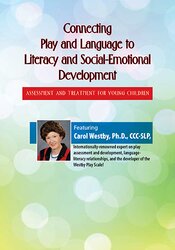

Don’t miss this opportunity to learn from Dr. Westby!
Language, cognitive and social-emotional learning skills are all essential for literacy development and academic success. Research shows that play is the universal activity that blends cognitive, social, emotional, linguistic and motor components. Observing children’s play provides information about their knowledge, views of the world and mastered skills.
Join Dr. Westby as you learn about the vital relationship between the dimensions of play, social-emotional functioning, language and literacy. Learn firsthand, how to effectively use the Westby Play Scale—a tool that offers a way to evaluate all young children’s (birth-5 years) symbolic play skills. Supported by 40 years of evidence-based research and organized by developmental level, this tool will breakdown the milestones children should be achieving with their play and language. You will also learn play practices and play strategies to improve language, cognitive and social-emotional skills, including:
These intervention activities will work for all young children, but special focus will be given to interventions for children with language learning disabilities, autism, socioeconomic/cultural variations and ESL.
This online program is worth 6.25 hours CPD.
| File type | File name | Number of pages | |
|---|---|---|---|
| Manual (2.47 MB) | 66 Pages | Available after Purchase |

Carol Westby, PhD, CCC-SLP, BCS-CL, ASDCS, is an internationally-renowned expert on play assessment and development in children. She is the developer of the renowned Westby Symbolic Play Scale, a research-based scale used to assess children's social and play skills. Dr. Westby has written and implemented projects to support personnel preparation, clinical service, and research, including Project PLAY (Play and Language Attunement in Young Children), that trains caregivers to increase the development of play, theory of mind, and language.
Dr. Westby is a fellow of the American Speech-Language-Hearing Association (ASHA), is Board-Certified in Child Language and Literacy Disorders, and has received the Distinguished Alumnus Award from Geneva College and the University of Iowa's Department of Speech Pathology and Audiology, the ASHA Award for Contributions to Multicultural Affairs, the Honors of ASHA, and the Kleffner Lifetime Clinical Career Award.
Dr. Westby has published and presented nationally and internationally on topics including play, autobiographical memory, theory of mind, language-literacy relationships, narrative/expository development and facilitation, adverse childhood experiences, screen time, trauma, metacognition/executive function, and assessment and intervention with culturally/linguistically diverse populations. She has consulted with the New Mexico Preschool for the Deaf, which employs a play-based curriculum.
Dr. Westby has been a visiting professor at Flinders University in South Australia where she worked on a language/literacy curriculum, and at Brigham Young University where she consulted on SEEL, a systematic and engaging emergent literacy program that employs playful practice. She is a consultant for Bilingual Multicultural Services in Albuquerque, NM and holds an affiliated appointment in communication disorders at Brigham Young University in Provo, UT. Dr. Westby is certified as an Autism Spectrum Disorder Clinical Specialist (ASDCS).
Speaker Disclosures:
| 5 |
|
| 4 |
|
| 3 |
|
| 2 |
|
| 1 |
|
Satisfaction Guarantee
Your satisfaction is our goal and our guarantee. Concerns should be addressed to info@pesi.co.uk or call 01235847393.
Please wait ...